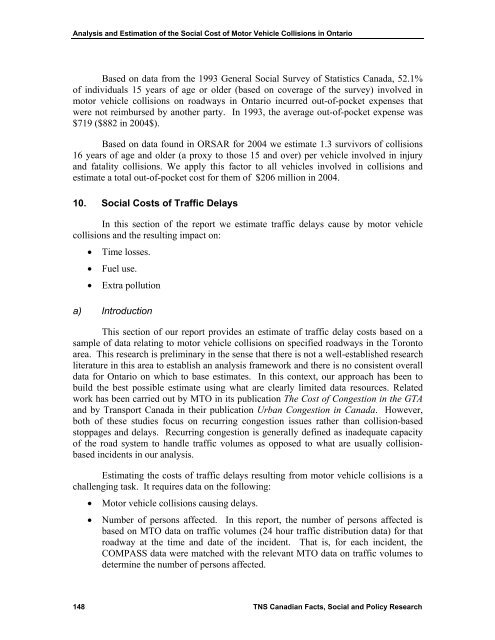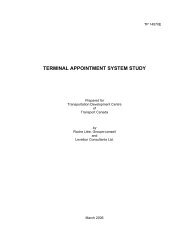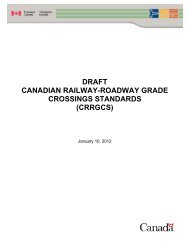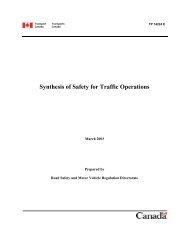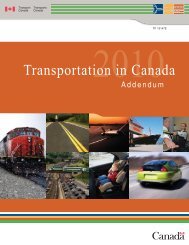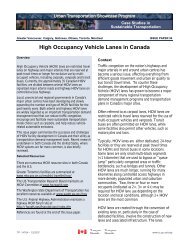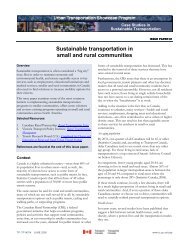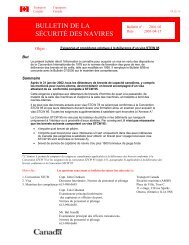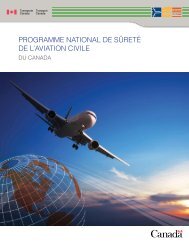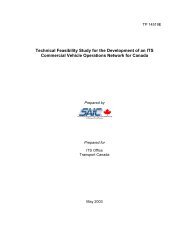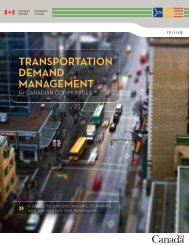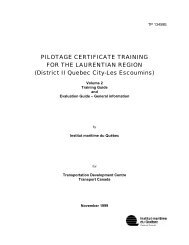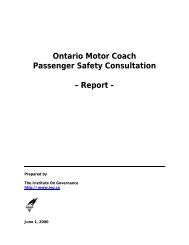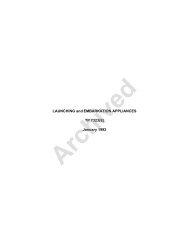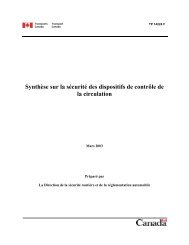Keith Vodden Dr. Douglas Smith - Transports Canada
Keith Vodden Dr. Douglas Smith - Transports Canada
Keith Vodden Dr. Douglas Smith - Transports Canada
You also want an ePaper? Increase the reach of your titles
YUMPU automatically turns print PDFs into web optimized ePapers that Google loves.
Analysis and Estimation of the Social Cost of Motor Vehicle Collisions in Ontario<br />
Based on data from the 1993 General Social Survey of Statistics <strong>Canada</strong>, 52.1%<br />
of individuals 15 years of age or older (based on coverage of the survey) involved in<br />
motor vehicle collisions on roadways in Ontario incurred out-of-pocket expenses that<br />
were not reimbursed by another party. In 1993, the average out-of-pocket expense was<br />
$719 ($882 in 2004$).<br />
Based on data found in ORSAR for 2004 we estimate 1.3 survivors of collisions<br />
16 years of age and older (a proxy to those 15 and over) per vehicle involved in injury<br />
and fatality collisions. We apply this factor to all vehicles involved in collisions and<br />
estimate a total out-of-pocket cost for them of $206 million in 2004.<br />
10. Social Costs of Traffic Delays<br />
In this section of the report we estimate traffic delays cause by motor vehicle<br />
collisions and the resulting impact on:<br />
• Time losses.<br />
• Fuel use.<br />
• Extra pollution<br />
a) Introduction<br />
This section of our report provides an estimate of traffic delay costs based on a<br />
sample of data relating to motor vehicle collisions on specified roadways in the Toronto<br />
area. This research is preliminary in the sense that there is not a well-established research<br />
literature in this area to establish an analysis framework and there is no consistent overall<br />
data for Ontario on which to base estimates. In this context, our approach has been to<br />
build the best possible estimate using what are clearly limited data resources. Related<br />
work has been carried out by MTO in its publication The Cost of Congestion in the GTA<br />
and by Transport <strong>Canada</strong> in their publication Urban Congestion in <strong>Canada</strong>. However,<br />
both of these studies focus on recurring congestion issues rather than collision-based<br />
stoppages and delays. Recurring congestion is generally defined as inadequate capacity<br />
of the road system to handle traffic volumes as opposed to what are usually collisionbased<br />
incidents in our analysis.<br />
Estimating the costs of traffic delays resulting from motor vehicle collisions is a<br />
challenging task. It requires data on the following:<br />
• Motor vehicle collisions causing delays.<br />
• Number of persons affected. In this report, the number of persons affected is<br />
based on MTO data on traffic volumes (24 hour traffic distribution data) for that<br />
roadway at the time and date of the incident. That is, for each incident, the<br />
COMPASS data were matched with the relevant MTO data on traffic volumes to<br />
determine the number of persons affected.<br />
148 TNS Canadian Facts, Social and Policy Research


